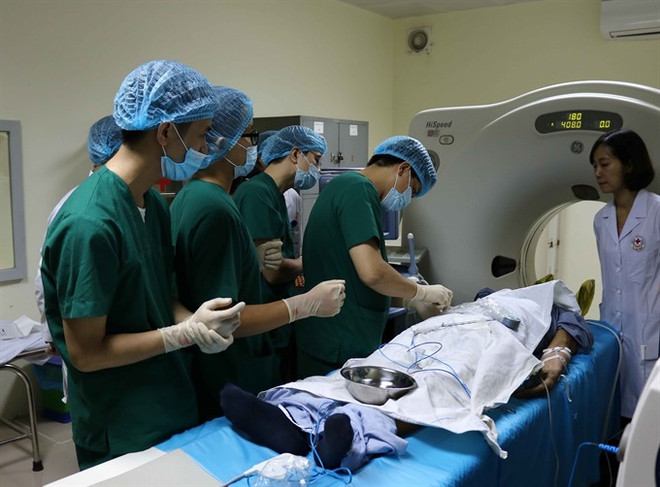 Doctors at Bac Ninh General Hospital use high-frequency sound waves to treat a patient with liver cancer (Photo: VNA)
Doctors at Bac Ninh General Hospital use high-frequency sound waves to treat a patient with liver cancer (Photo: VNA)HCM City(VNA) – Vietnam’s national cancer control strategy needed to address theserious problem of infectious agents, which cause more than 20 percent ofmalignancies in the world, said Prof Nguyen Chan Hung, Chairman of the Vietnam CancerSociety.
Speaking at a recent conference held in HCM City, Hung said the rate ofinfectious diseases in developing countries was four times higher than that indeveloped countries.
He claimed several infectious agents were linked to some of the most commoncancers.
Helicobacter pylori (H.pylori), which causes chronic inflammation in stomachand duodenum, is a common cause of ulcers, while hepatitis viruses B and C andthe human papillomavirus (HPV) can also cause cancer.
H. pylori infections and viral hepatitis are agents for gastric and livercancers, while HPV infections can cause not only cervical cancer but also anal,oropharyngeal, vulval and penile cancers.
“Appropriate policies for prevention of infectious diseases would help opendoors for cancer control. We have a good opportunity for cancer control byeliminating some infectious agents,” Hung said.
Vietnam has vaccines against hepatitis B virus and HPV, which help preventinfection, he said.
Figures from the Thai Nguyen Oncology Centre showed that the number of patientswith infectious diseases at the centre had doubled between 2012 and 2016.
The role of molecular biology was also highlighted as it was a potent tool tomake new medicines for breast and lung cancer.
Health experts from oncology hospitals and centres said they had performedinvasive surgeries that had resulted in a high level of preservation of healthycells in patients with cancer.
Advanced radiotherapy techniques used to improve accuracy in treatment did notaffect healthy cells around the cancerous cells.
According to Professor Hung, leading causes of cancer today are smoking andcigarette’s smoke, followed by unhealthy lifestyles, eating and the infection(viruses, bacteria, parasites).
“There are solutions for these causes, there are vaccines, but mostimportantly, humans must know to avoid the causes in the first place,” he said.
According to Hung, many people think hepatitis B or C is normal and not muchattention is needed, but this negligence ultimately results in cancer.
Cigarette smoke, aside from the well-known lung cancer, also contains 75powerful carcinogens that can cause 15 cancers.
He also advised against consumption of fatty meat, salty food or oily dishes,and recommended higher intake of vegetables and fruit.
Sharing the same viewpoint, Professor Nguyen Tan Binh, Director of the HCMCity’s Department of Health, said that 40 percent of the causes of cancer couldbe prevented if advocacy and awareness campaigns were effective.
“In 2016, at a conference held by World Health Organisation on the medicalachievements made in the West in 50 years, the most important element that itrecognised was convincing people to give up smoking,” Binh said.
Dr Tran Van Thuan, Director of the K Hospital, under the management of theMinistry of Health, said the most important element in the fight against cancerwas early detection.
In K Hospital, for example, screening techniques for nine types of popularcancer (in both men and women – breast cancer, cervix - ovary, liver, lung,stomach, colorectal, nasopharynx, thyroid, prostate) were conducted. Eachscreening test cost the patient only 2-3 million VND (87-131 USD), a pricerange affordable to most people.
According to experts, Vietnam records 94,000 deaths from cancer each year. Mostcancer patients only come to hospitals when the disease has reached laterstages, making treatment more complicated and costly.
“The new technologies to early detect cancer have been adopted by most leadinghospitals in the country. K Hospital and some other medical centres in thecountry have started to make use of a biology bank to aid research and controlcancer,” Thuan told Thanh nien (Young People) newspaper.
Professor Ta Van To, director of K Hospital’s Pathology and Molecular BiologyWard, said the biology banks preserved cancer tissue samples for a longtime at sub-zero condition (minus 80 degrees Celsius). These samples were usedin research on drug resistance and drug resistant genes.
Tran Thi Nhi Ha, deputy director of Hanoi’s health department, said the capitalcity was the first in the country capable of providing a complete package forrectal cancer – from early screening, diagnosis, to counselling and treatment.
Since May, Saint Paul Hospital has conducted two mass screenings for rectalcancer in 100,000 people at elevated risks (over 40 years old) in eightdistricts and townships in the city. Six per cent of those screened testedpositive, Ha said.-VNA





























